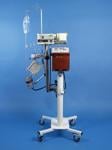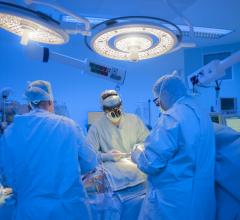
September 30, 2009 – MAQUET Cardiovascular said Johannes Bonatti, M.D., professor of surgery and director of coronary surgery and advanced coronary interventions at the University of Maryland Heart Center in Baltimore, recently completed the world's first use of the MAQUET Minimized Extra-Corporeal Circulation (MECC) system during a successful robotic and fully endoscopic heart surgery. The company said the new cardiopulmonary bypass technology is the first major advancement in perfusion technology in the last decade. It is designed to minimize the effects of traditional heart surgery and aid in minimally-invasive heart surgery without the need to stop the patient's heart from beating. "The difficulty in performing robotic beating heart bypass surgery safely and comfortably on a patient has been a barrier to the growth of minimally invasive procedures, despite their benefits to patients over more open approaches," said Dr. Bonatti. "A miniaturized cardiopulmonary bypass system, such as MAQUET's MECC technology, provides alternatives to surgeons performing robotic surgery and allows patients who were previously not a candidate to receive minimally invasive interventions." Dr. Bonatti is a leader in the growing field of totally endoscopic coronary surgery. Through his use of robotic surgical equipment, Dr. Bonatti offers his patients an alternative to open surgery that has been demonstrated to reduce overall recovery time and enable patients to return to their daily activities significantly faster than with traditional bypass surgery. Traditional bypass surgery uses a standard heart lung bypass machine with catheters inserted directly into the patient's heart. The heart is stopped, allowing the surgeon a static area in which to sew and connect bypass grafts. However, it has been demonstrated that outcomes can potentially be improved if the heart is not stopped (Puskas et al, Annuals of Thoracic Surgery, 2007;84:1447-56). The revolutionary MECC system, in contrast, typically requires the placement of two catheters in the patient's upper thigh and does not require the surgeon to stop the patient's heart during surgery. The combined effect of allowing the heart to remain beating, the reduction of tubing needed, and the reduced amount of fluid required to dilute the blood versus that needed in traditional bypass, offers improved safety and the ability to offer a minimally invasive approach to the patient. Diluting the patient's blood during routine bypass surgery has been associated with an increased need for blood transfusions. MECC technology requires only a small amount of fluid to be given to the patient and, therefore, decreases the likelihood of a necessary blood transfusion. The MECC system has incorporated many built-in features over existing technologies that may benefit patients. The company said the system has a heparin coating called BIOLINE, providing biocompatibility and improving overall safety. The system reduces the need for blood transfusions. There is minimized systemic inflammatory response through MECC's reduced surface activation. The prime volume is also significantly lowered from the small size of MECC's tubes and catheters resulting in a decrease of blood dilution. "Utilizing MECC in lieu of a conventional bypass system provides a unique mechanism of patient surgical management that we have not had access to before," said Brian McCormick, C.P.P., chief perfusionist, Coalition of Perfusion Services at the University of Maryland Medical Center in Baltimore. "We can essentially manage our patients as if they were on a traditional bypass circuit but negate the routine complications such as blood loss, systemic inflammatory response and blood dilution that we have to constantly manage during the surgery." For more information: www.maquet.com


 January 15, 2026
January 15, 2026 









